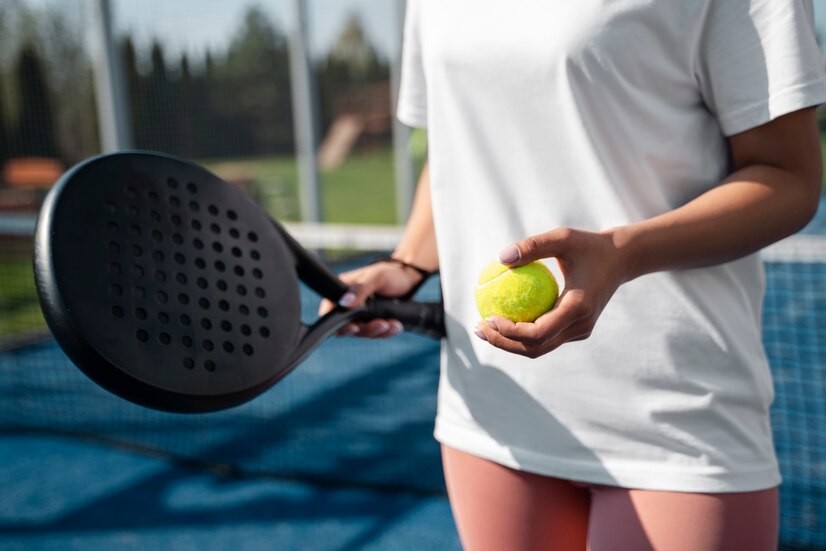Serving in Padel is a crucial part of this dynamic racket sport. Understanding the basic rules and techniques can give you a significant advantage on court. In this article, we’ll detail everything you need to know about the Padel serve, from the starting position to the impact on the game.
Basic Padel Service Rules
Like tennis, the Padel serve starts the point, but there are some key differences. Here are the basic rules you need to know to serve well:
- The serve must be diagonal.
- The server must be positioned behind the service line.
- The ball must be hit below the waist.
- The ball must bounce into the opposite service box before hitting the walls.
- Two service attempts are allowed per point.
These fundamental rules govern how the service should be carried out, thus ensuring fair and structured play.
Starting position for the serve
The starting position is crucial for a successful serve in Padel. The server should stand behind the service line, facing the net. The feet should be placed in a stable position to ensure good balance. Here are a few tips for an optimal position:
- Place your front foot slightly turned towards the opposite service square.
- Keep your back foot parallel to the baseline.
- Make sure your feet are not touching the service line.
- Keep your knees slightly bent for extra stability.
A good starting position will allow you to hit the ball efficiently and have better control over your serve.
Padel Service Technique
Service technique is an essential component of successful padel tennis. The serve is always made with a forehand, hitting the ball below the waist. Here are the steps to follow:
- Throw the ball: Hold the ball in one hand and the racket in the other. Throw the ball slightly downwards and forwards so that you can hit it while ensuring that it stays below your belt.
- Synchronisation: Synchronisation between throwing and hitting is essential for an effective serve.
- Point of Contact: The point of contact with the ball should be slightly in front of the body to maximise the strength and accuracy of the serve.
- Follow through: Once the ball has been hit, follow through with the racket towards the target to improve accuracy.
A good serve technique will not only allow you to start the point well, but will also put your opponent in difficulty from the outset.
Types of serve in Padel
There are several types of serve in Padel, each with its own advantages and disadvantages. Here is a description of the main types:
- Flat serve: A fast, direct serve, ideal for surprising your opponent.
- Lifted serve: A serve with a lifted effect that makes the ball bounce higher after the first bounce, making it harder for your opponent to catch.
- Worked serve: A serve with lateral spin, making the trajectory of the ball more unpredictable and difficult to anticipate.
- Lobbed serve: A slower, higher service, used to vary the pace and force the opponent to step back.
Choosing the right type of serve according to your strategy and your opponent’s style of play can considerably influence the outcome of the point.
Service faults
Understanding what constitutes a service fault is essential to avoid penalties and maximise your chances of starting the points in good conditions. Here are some common faults:
- Foot on Line: If the server touches the service line when hitting the ball.
- High ball: If the ball is hit above the waist.
- Ball out of bounds : If the ball does not bounce into the opposite service box.
- Ball in the net: If the ball touches the net before bouncing into the service box.
Avoiding these errors can make your serve much more effective and reliable.
Tips for improving your serve
Improving your serve takes practice and concentration. Here are a few more tips:
- Repetition: Practice regularly to develop a solid technique.
- Video: Record yourself in order to analyse and correct your technique.
- Coaching: Working with a coach can offer personalised advice and tailored exercises.
- Consistency: Focus on consistency rather than power.
- Vary: Vary your serves to keep your opponent on his toes.
By following this advice, you can make rapid progress and become a formidable server.
Impact of the serve on the game
Serving in Padel isn’t just about putting the ball in play; it also has a major strategic impact. A good serve can immediately put your opponent in trouble, giving you an advantage for the rest of the rally. Here are a few aspects of the impact of the serve:
- Initiative: A well-placed serve puts pressure on your opponent, allowing you to take the initiative in the rally.
- Psychology: An effective serve can affect your opponent’s morale, especially if you can repeat the success regularly.
- Positioning: A well-executed serve influences the positioning of players on the court, favouring attacking opportunities.
A good serve can be a major asset in your game strategy, offering a psychological and tactical advantage. Understanding the rules and techniques associated with the Padel serve is essential for any player wishing to improve and perform well on the court. Practising regularly and paying attention to the details mentioned in this article will help you develop an effective and strategic serve. For more content on Padel and quality equipment, please visit our blog and explore our range of Padel equipment at Bandeja Shop.

